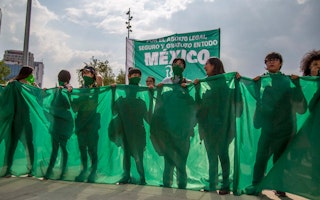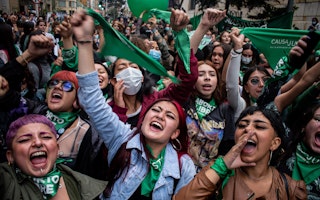A New Colombia?
By David Holiday
Recently I spoke with Juanita Leon, who runs the political news website La Silla Vacia, about Colombia’s recent presidential elections. She is a former Open Society Fellow and current grantee of the Open Society Foundations.
How will the government of newly elected President Juan Manuel Santos differ from that of former President Alvaro Uribe?
I think Santos will reestablish some dignity to the presidential role. He is a pragmatic, Harvard-educated elite, who cares about what the international community thinks. That’s a big difference from Uribe, who is more provincial, very ideological, and was obsessed with eliminating the guerrillas. We won’t see Santos insulting the courts, ordering the arrest of someone on TV, calling journalists bad words, or persecuting his enemies as was common with Uribe.
He’ll have more power than Uribe, because he has called for a national unity government, owns his own media outlet, and has support from 80 percent of Congress, the Bogota elite, and the Americans. The fact that he doesn’t come from a mafioso world also helps.
Santos has a “dream team” of good technocrats with experience in government, unlike Uribe’s cabinet. And I’m sure he’ll try to lead a peace process with the FARC, as he mentioned in his inauguration speech. His ambition is to immortalize himself in history—this has been his ambition since he was a kid—and closing a deal with the guerrillas will be the clearest path for that. We’ll have to wait and see.
It seemed at one point that Antanas Mockus, the eccentric former mayor of Bogota, had a real chance to win the presidential election. What happened?
That was a big surprise—Uribe’s government mobilized every resource at its disposal to prevent Mockus's victory, and Mockus made every mistake possible to lose.
There was an intense rumor campaign saying that Mockus would end all social programs and close public universities, which generated fear amongst the poor and mobilized them to vote against him. Santos, who served as Uribe’s defense minister before being elected president, claimed that Mockus planned to end Familias en Acción, a subsidy program that gives $100 to 2.3 million women.
Mockus also made several mistakes. He couldn’t answer the question of whether he was an atheist or not. First he said he prayed to Borges, a famous Latin writer, and then claimed that he was a true Catholic. These types of inconsistencies were well exploited by his rival. And then he said he admired Hugo Chávez, Colombia’s biggest enemy in the mind of many Colombians. He also insisted in every appearance in the last week of the campaign that he would raise taxes. People just didn’t trust that he would be able to govern the country.
Finally, how important was social media and youth involvement in these elections?
I think young people and social media tools were key to Mockus’s rise in the polls. Even though Mockus's results were disappointing compared to the expectations created by the polls, and by the fervor showed by the people, the fact that a new party created less than a year ago came in second is really surprising. The last time that Mockus ran for president, he didn’t even get 100,000 votes. This time, he got 3.6 million votes.
He had a very austere and disorganized campaign, and he was able to defeat all the other traditional parties because his followers ran the campaign for him. Facebook mobilization was key, and young people took the campaign into their own hands—they made the posters, printed t-shirts, went door-to-door. Of course, doing an open-source campaign for the first time was not enough to get him to the presidency, but it was enough to scare the entire political establishment into coming together to prevent his victory.

Until November 2021, David Holiday was a unit manager in the Latin America Program at the Open Society Foundations.


